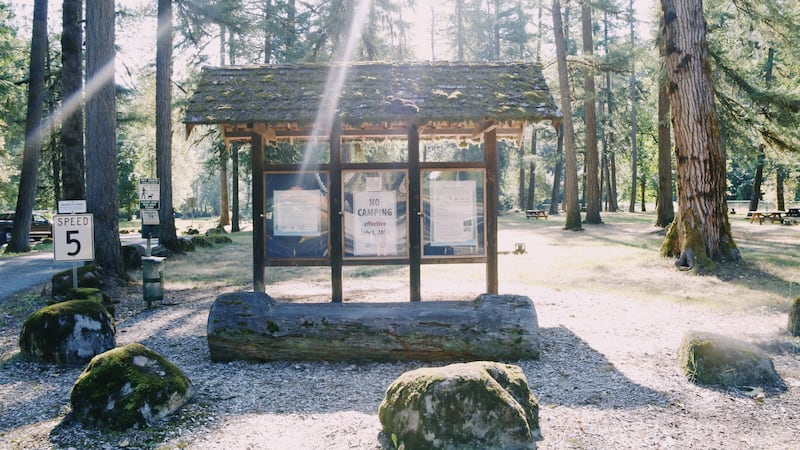Finding a forest campsite near Portland is a perennial struggle. This year, it got even harder—thanks to a city budget cut that was made with little discussion.
Starting July 1, visitors to Dodge Park, where the crystalline Bull Run River flows into the Sandy River, found its 25 campsites and park restroom closed. That ends the central public use of what was once among the city's recreational treasures.
"I know Dodge Park is not a critical facility," says Tony Jordan, an avid Portland cyclist. "I'm privileged to have the health and fitness to have ridden out there more than 50 times over the last 10 years or so and seen it in all seasons, empty and full. It's a cool place and I just think it's really strange that it was closed with so little notice and transparency."
Dodge Park is an unlikely spot for Portland to operate a park at all. It's not even in Portland—it's deep in the Clackamas County woods, and the nearest town is Sandy, Ore.

But Portland owns the property because of its proximity to the Bull Run Watershed, the mountain wilderness where the city gets its supply of drinking water. In 1911, city officials built a rail line from the Southeast Portland neighborhood of Montavilla to Dodge Park, to haul supplies for building a hydroelectric dam. The next year, that railway became a tourist trolley—and carried hundreds of bathers to the rivers each weekend.
"A conservative estimate of visitors during the last summer would be thirty thousand," says the annual report for the Portland Water Bureau for 1926. "At times there was hardly room enough to accommodate the crowds that poured into the park on Sundays."
But this year, Dodge Park's campground fell victim to a small but hidden cut as the City Council grappled with a projected $6.3 million budget shortfall for Portland Parks & Recreation.
The council dealt with the bureau's budget woes by very publicly debating and then voting to close at least two community centers this year—Laurelhurst on July 1 and Sellwood on Sept. 1—and an indoor pool next year.
But officials also shuttered the facilities at Dodge Park, which isn't owned by Portland Parks & Recreation but by the Water Bureau.
City Commissioner Amanda Fritz, who oversees the Water Bureau, said she made the decision to close the campground because keeping it open wouldn't have been fair to Portland neighborhoods that face losing their parks facilities.
"With Portland Parks & Recreation facing huge cuts in the 2019-20 budget," Fritz tells WW, "I could not in good conscience put in a budget request for general fund resources for recreational facilities at a Water Bureau property more than 15 miles outside of Portland."
But the amount needed to keep it open was just $61,700 a year, according to Fritz's office.
In addition to general fund dollars, which come from citywide taxes and fees, campers using Dodge Park also paid a fee: $23 a night. (Until several years ago, the park didn't spend any general fund dollars. Instead, it was funded by water and sewer ratepayers. But the settlement of a 2011 lawsuit brought by several Water Bureau ratepayers ended that practice and meant the park had to compete again for general fund dollars.)
Fritz's argument for closing Dodge doesn't satisfy everyone. The Water Bureau didn't face the systemwide financial shortfall that paralyzed Portland Parks & Recreation—a shortfall that followed the bureau's aggressive opening of new parks ("Parks and Wreck," WW, July 17, 2019).
It's also unlikely many people knew the Water Bureau had chosen not to keep the park open.
It was discussed at a utility board meeting, but the bureau's budget request mentioned no cuts to Dodge Park, and Jordan argues city residents should have been given time to make their case or at least fundraise.
"I don't know that I would advocate for Dodge Park to remain open if it meant another facility would be closed in the city, either," says Jordan. "It's not clear to me, however, that closing Dodge Park kept any other facilities open, saved any parks employees' jobs, or whether it will end up saving the city money in the long run."
